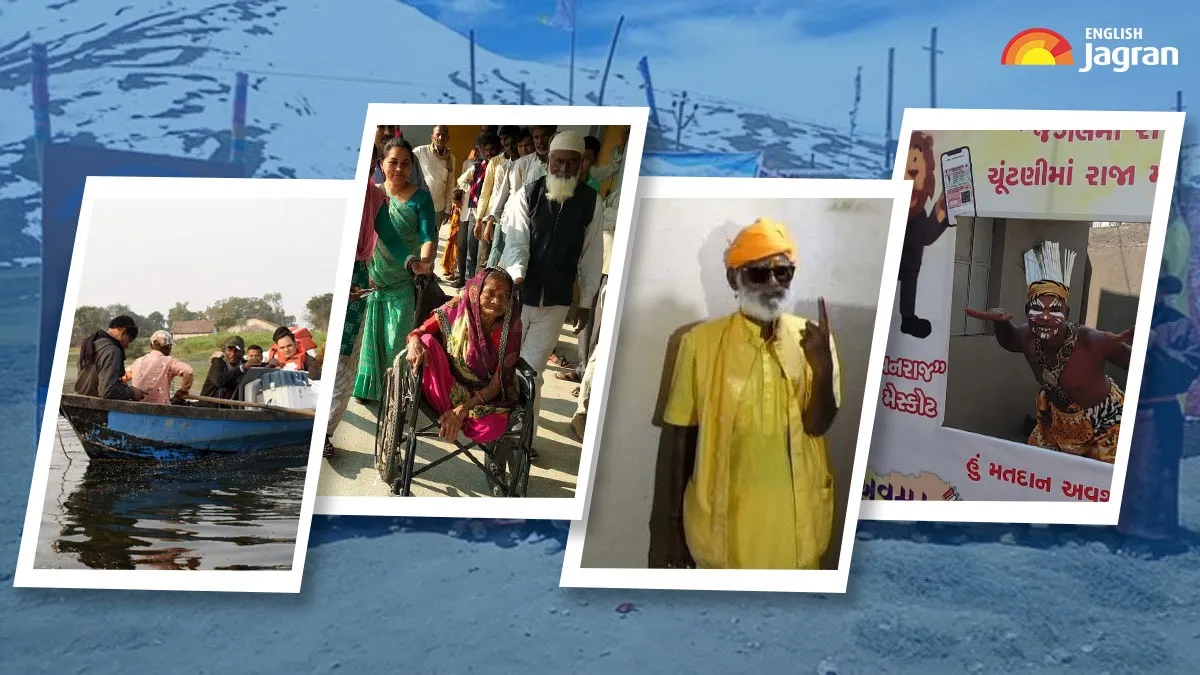- By Abhirupa Kundu
- Wed, 20 Mar 2024 07:48 PM (IST)
- Source:JND
Gir forest's Mahant Bharatdas Bapu, a priest in an ancient Shiva temple was welcomed with a bouquet of flowers to participate in the festival of democracy in 2019. The lone voter walked through the lush greens and exercised his franchise, this signified that even a single vote is of utmost importance when it comes to elections. The Election Commission of India (ECI) keeping up with its efforts to maximise the participation of all eligible voters has once again arranged a plethora of measures that will aid in enabling the 96.8 crore electors to elect a new government for the next five years.
The Election Commission has introduced several methods including setting up polling stations for only one voter, booths for families residing near scattered islands in Tripura's Dumbur Lake where officials travelled by boats to reach the zone, allowing voters above the age of 85 and people with disabilities to vote from home. Apart from this the ECI has arranged ramps, wheelchairs and volunteers to make sure the specially-abled do not hesitate to exercise their democratic right.
One Man-One Vote
— All India Radio News (@airnewsalerts) April 23, 2019
Election Commission has setup a polling booth for one voter at Banej Gir,Somnath Dt,#Gujarat.
▪️Mahant Bharat das bapu cast his vote and appealed to the people to vote in large numbers.#PollsWithAIR#Report:Yogesh pic.twitter.com/nnXZgFBgHN
The EC will also be arranging transport facilities for the elderly and the Saksham app which will aid voters to avail the facilities at the polling stations. Assured Minimum Facilities (AMF) in booths made in schools which include facilities like drinking water, toilets, wheelchairs and ramps have also acted as gifts of the election process to students.
'We Walk An Extra Mile, So You Don't Have To'
The Election Commission has not limited its facilities to just booths, it has vowed to reach to the doorstep of voters who cannot reach the stations. Not just by foot, but on boats, riding on elephants, horseback, and via helicopters among the other usual methods of transport including buses, cars and jeeps, booth-level officers will be reaching out to every elector across the nation. Braving snow-covered peaks, flooded streets, rivers and steep ranges these officials will work towards their motto: "No voter to be left behind".

The electoral body has also upgraded its technology sector with 27 IT apps or systems.
Voter Helpline App (VHA): This system will allow you to register to vote, check your names in the electoral list, view polling booth details, and connect with the booth-level officer.
cVigil: This all-in-one application will enable you to record, report and resolve violations. Chief Election Commissioner, Rajiv Kumar said that the response time to these complaints would be 100 minutes and grievances can be reported anonymously.
Suvidha Portal: The portal will allow the candidates in the electoral fray to seek permissions for meetings and rallies and will ensure a level playing field - 'first in first out'. It will also be used to file nominations and affidavits.

The electoral race has always been an exciting journey, especially for a country like India, whose democratic tapestry is determined by the myriad colours of voters belonging to different ethnicities, communities, religions, and castes and the inclusivity of every citizen from both the urban and rural populace.
From Gir's lone voter for whom a team of eight people set up a booth at Banej, nested approximately 35 kilometres inside the forest in Gujarat also home to around 600 lions, to families residing near the International border in Tripura, the electoral map of India has seen many colourful stories of the polling process.
Polling teams ensuring #NoVoterToBeLeftBehind#ECI pic.twitter.com/WT8JlaJtiW
— Election Commission of India (@ECISVEEP) January 18, 2023
How To Register To Vote
Any Indian citizen living in the country, who is 18 years of age or older, can register as a General Voter. To do so, they can complete Form 6 either through the Voter Helpline App or by visiting https://voterportal.eci.gov.in/.
Additionally, they should upload copies of the required documents. The requisites include filling up details such as your name, address, and date of birth. Apart from this, you will also need to provide a scanned copy of a passport-size photograph, address proof, and identification evidence.
To register offline, obtain two copies of Form 6 from the offices of Electoral Registration Officers, Assistant Electoral Registration Officers, or Booth Level Officers, where it is available at no cost.

Complete the form and submit it along with copies of the required documents in person to the relevant Electoral Registration Officer or Assistant Electoral Registration Officer. Alternatively, you can send the application by post to the respective officer or hand it over to the Booth Level Officer in your polling area. For assistance, you can call 1950.
The Lok Sabha elections, encompassing 543 constituencies across India, are set to be held in seven phases between April 19 and June 1.
The polling dates for each phase are as follows: Phase 1 on April 19, Phase 2 on April 26, Phase 3 on May 7, Phase 4 on May 13, Phase 5 on May 20, Phase 6 on May 25, and Phase 7 on June 1.
The counting of votes is slated for June 4, marking the culmination of this extensive electoral exercise and heralding the onset of a new government chosen by the people of India.
